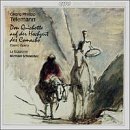| All Artists: Georg Philipp Telemann, Michael Schneider, Mechthild Bach, Michael Schopper, Raimund Nolte, Michae Schopper, La Stagione Frankfurt, Helmut Schaarschmidt, Burkhard Schmilgun, Silke Stapf, Heike Hallaschka, Annette Kohler Title: Telemann: Don Quichotte auf der Hochzeit des Comacho Members Wishing: 0 Total Copies: 0 Label: Cpo Records Release Date: 1/25/1995 Genre: Classical Styles: Opera & Classical Vocal, Historical Periods, Baroque (c.1600-1750) Number of Discs: 2 SwapaCD Credits: 2 UPC: 761203921027 |
Search - Georg Philipp Telemann, Michael Schneider, Mechthild Bach :: Telemann: Don Quichotte auf der Hochzeit des Comacho
 | Georg Philipp Telemann, Michael Schneider, Mechthild Bach Telemann: Don Quichotte auf der Hochzeit des Comacho Genre: Classical
|
Larger Image |
CD Details |
CD ReviewsNothing 'Quixotic' about Telemann! Giordano Bruno | Wherever I am, I am. | 09/25/2009 (5 out of 5 stars) "His adventures were always purposeful and usually crowned with success. Georg Philipp Telemann (1681-1767) was as energetic a businessman as a composer; uniquely among German composers of the Baroque, Telemann diligently oversaw the publication and distribution of his music, both secular and sacred. The happy outcome is that "we" have probably a larger share of Telemann's prodigious output than of any comparably gifted and prolific baroque composer except Handel. The one exception is Telemann's operas and serenatas (smaller works for the musical stage). That's a big exception, however. Telemann was as industrious a theatrical composer as he was in other genres, and Hamburg was the opera capital of north Europe... until 1738, when the Gänsemarkt Opera closed.
The scanty sources suggest, however, that Telemann continued to 'track' the evolution of the Singspeil, the German-language 'popular' form of opera that reached apotheosis in works by Mozart and von Weber. "Don Quichotte auf der Hochzeit des Comacho" is a Singspeil in one act, written in 1761 and performed in a concert setting in Hamburg that year. A young Hamburg poet, Daniel Schiebeler, had presented a libretto based on one charming episode from Cervantes's Don Quixote to Telemann, and Telemann responded enthusiastically with this 'song-poem for the theater'. Telemann in his old age kept close contact with the younger literary circles of Hamburg, a contact that provided him with the best texts for his glorious cantatas. "Don Quichotte" is a comic pastoral Singspeil, with the laughs predictably provided by Sancho Panza and the deluded Don, both sung by basses. Telemann was dissatisfied with the merely spoken lines of the typical Singspeil, and preferred to set all the libretto to recitativos, arias, and choruses. That, of course, makes an unstaged recording of Don Quichotte a far more entertaining experience for modern listeners. Nonetheless, I'd love to see Don Quichotte staged. The theatrical values of the work are obvious; it would 'work' as a one-act drama. The villagers - Pedrillo, Grisostomo, Quiteria, and Comacho - are sung by sopranos and an alto, on this recording all female singers. Basilio, the poor shepherd who steals the beautiful Quiteria from the rich suitor Comacho by a clever ruse, is sung passionately by tenor Karl-Heinz Brandt. Overall, the singing in this performance is precisely what the Singspeil demands - broadly exaggerated for humor yet still perfectly musical. The rustic choruses and dances of the villagers are what make Don Quichotte such a balmy entertainment. Telemann was exceptionally attuned to the charms of folk music and incorporated more of it into his work than any other comparably 'elevated' Baroque composer. That was evident in his earliest cantatas in Eisenach, 50 years before Don Quichotte, and it's true in this single late contribution to the development of distinctly German music. CPO - Classic Production Osnabrück - is almost infallible in its choice of ensembles and singers to perform lesser-known masterworks of German Baroque. The chamber orchestra of La Stagione, conducted by Michael Schneider, sustains that record of excellence. It helps, naturally, that the 1993 ensemble included luminaries of Baroque performance such as harpsichordist harald Hoeren and trumpeter Friedemann Imler." |

 Track Listings (28) - Disc #1
Track Listings (28) - Disc #1